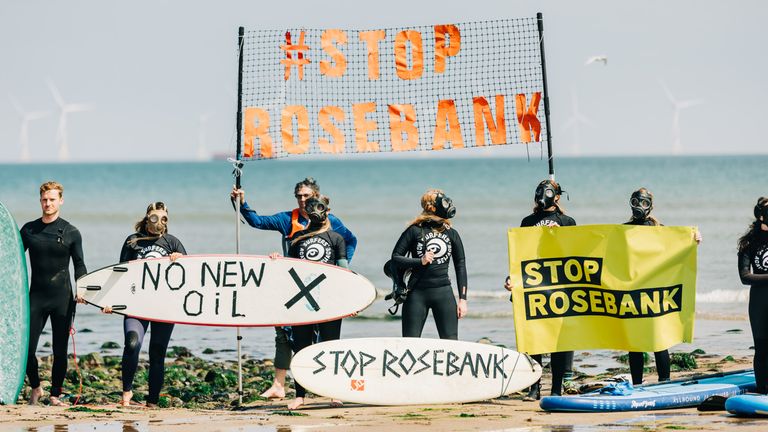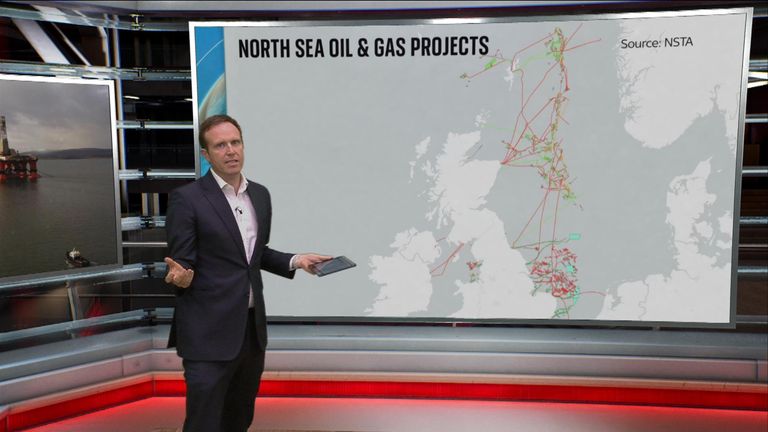Rosebank and Jackdaw: Government to drop legal defence of UK’s largest untapped oil and gas fields


The government will not defend the legal challenges brought against plans to develop the UK’s largest untapped oil and gas field and a second North Sea site.
Rosebank, 80 miles west of Shetland, contains around 300 million barrels of oil and is the UK’s last major undeveloped oil site.
It is twice the size of the controversial Cambo oil field.
Jackdaw, another untapped gas site, is 150 miles east of Aberdeen.
Legal claims against developing the sites for oil had been brought by environmental campaign groups Greenpeace and Uplift.
Policy changing
On Thursday, the government confirmed it would now not contest these legal claims by green groups.
It follows a landmark Supreme Court decision in June which said the environmental impact of emissions from burning fossil fuels must be considered in planning applications for extraction projects – not just the emissions produced in extraction.
Last month the new government admitted the decision to approve a new coal mine in West Cumbria was unlawful, as the carbon emissions from eventually burning the coal should have been taken into account.
Advertisement
The International Energy Agency has said no new fossil fuel project is compatible with the globally accepted goal of limiting warming to 1.5C.
Please use Chrome browser for a more accessible video player
1:42
The UK’s largest untapped oil and gas field had been approved by the government’s North Sea Transition Authority (NSTA).
What next?
It’s still possible for developers hoping to drill at the sites, energy giants Shell for Jackdaw and Norwegian state-owned Equinor for Rosebank, to continue to defend the claims.
The case could also be defended by the regulator that signed off on Rosebank’s approval, the North Sea Transition Authority.
If the authority does defend the decision the challenge will move to the Scottish courts, where the regulator is based.

Keep up with all the latest news from the UK and around the world by following Sky News
The exploration licences granted for oil and gas extraction at the sites have also not been revoked by the government.
The government’s concession, however, means it’s unlikely the approval will be held lawful. This would pave the way for the Labour government to have to decide on Rosebank.
Reaction
“Rosebank is also a bad deal for Britain”, Tessa Khan the executive director of Uplift said.
“It’s mostly oil for export and would do nothing to lower bills or boost our energy security yet, because of huge tax breaks for new oil and gas drilling, the UK public would effectively cover a huge chunk of the costs of developing it.”
“It is astonishing that the massive emissions from burning oil and gas have been overlooked by decision-makers till now,” she added.
Please use Chrome browser for a more accessible video player

2:44
Sky’s Ed Conway in September analysed whether new oil and gas fields would increase the UK’s energy security or make commitments to net zero difficult to reach.
In reaction to the announcement Greenpeace’s UK climate team leader Mel Evans said:
“This is absolutely the right decision from the government. These permits should never have been granted without being properly assessed for their impact on the climate, and following the Supreme Court ruling earlier this year, conceding these cases is the logical course of action.”
Equinor said: “We’re currently assessing the implications of today’s announcement and will maintain close collaboration with all relevant stakeholders to advance the project”.
“Rosebank is a vital project for the UK and is bringing benefits in terms of investment, job creation and energy security.”
A Shell spokesperson said: “We are carefully considering the implications of today’s announcement by the government”.
“We believe the Jackdaw field remains an important development for the UK, providing fuel to heat 1.4 million homes and supporting energy security, as other older gas fields reach the end of production.”